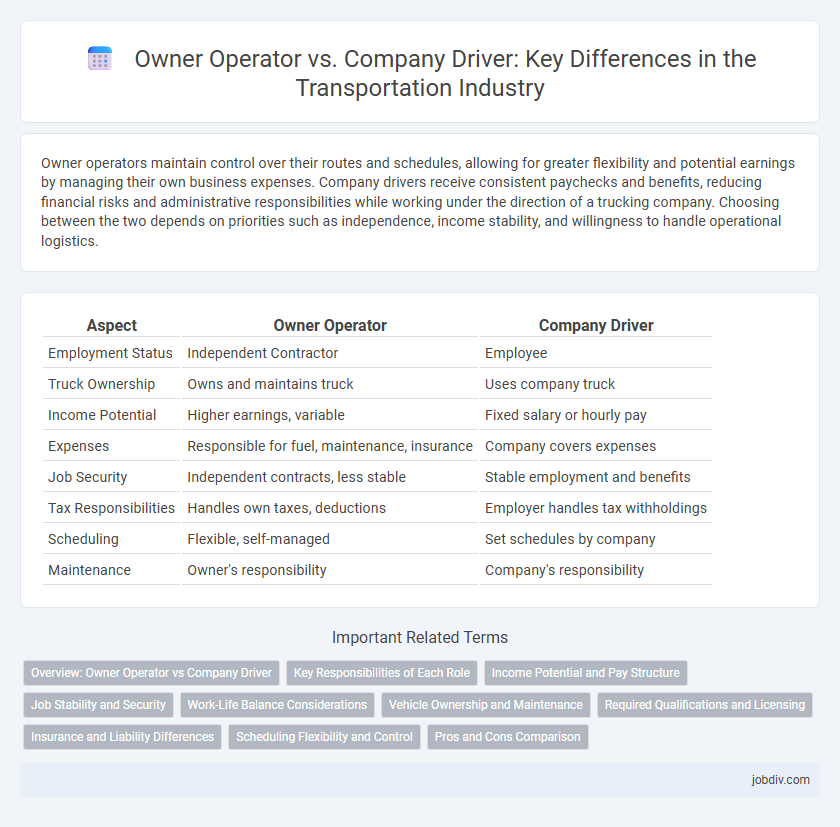Owner operators maintain control over their routes and schedules, allowing for greater flexibility and potential earnings by managing their own business expenses. Company drivers receive consistent paychecks and benefits, reducing financial risks and administrative responsibilities while working under the direction of a trucking company. Choosing between the two depends on priorities such as independence, income stability, and willingness to handle operational logistics.
Table of Comparison
| Aspect | Owner Operator | Company Driver |
|---|---|---|
| Employment Status | Independent Contractor | Employee |
| Truck Ownership | Owns and maintains truck | Uses company truck |
| Income Potential | Higher earnings, variable | Fixed salary or hourly pay |
| Expenses | Responsible for fuel, maintenance, insurance | Company covers expenses |
| Job Security | Independent contracts, less stable | Stable employment and benefits |
| Tax Responsibilities | Handles own taxes, deductions | Employer handles tax withholdings |
| Scheduling | Flexible, self-managed | Set schedules by company |
| Maintenance | Owner's responsibility | Company's responsibility |
Overview: Owner Operator vs Company Driver
Owner operators manage their own trucking business, handling vehicle maintenance, fuel costs, and route planning, which offers greater autonomy and higher earning potential but involves significant financial risk. Company drivers work for established trucking companies, receiving steady wages, benefits, and support with compliance and logistics, ensuring stability but less control over schedules and routes. Choosing between owner operator and company driver depends on personal preferences for independence, risk tolerance, and income goals in the transportation industry.
Key Responsibilities of Each Role
Owner operators manage their own trucking business, handling vehicle maintenance, route planning, and securing contracts directly with clients, ensuring timely and efficient delivery. Company drivers focus primarily on operating company-owned vehicles, adhering to assigned routes and schedules while complying with company policies and safety regulations. Both roles require strong driving skills and regulatory knowledge, but owner operators bear additional responsibilities related to business management and financial oversight.
Income Potential and Pay Structure
Owner operators typically earn higher income potential due to control over freight selection and the ability to negotiate rates directly with clients, often resulting in profit margins that surpass those of company drivers. Pay structure for owner operators revolves around gross revenue minus operating expenses such as fuel, maintenance, and insurance, while company drivers receive fixed salaries or hourly wages with benefits provided by the employer. Understanding the differences in pay models is crucial for drivers deciding between the stability of a company driver role and the entrepreneurial approach of an owner operator.
Job Stability and Security
Owner operators face income variability tied to market demand and fuel prices, affecting job stability, while company drivers benefit from steady paychecks and consistent routes ensuring financial predictability. Company drivers receive employer-provided benefits such as health insurance and retirement plans, contributing to overall job security rarely available to owner operators. The contractual independence of owner operators offers flexibility but exposes them to risks of contract termination and maintenance costs absent in traditional company driver roles.
Work-Life Balance Considerations
Owner operators have greater control over their schedules, allowing for more flexibility to manage personal time and reduce burnout, but they also face the stress of business responsibilities and inconsistent income. Company drivers benefit from structured hours, steady pay, and fewer administrative tasks, which can enhance work-life balance but may limit freedom in route and schedule choices. Balancing these factors depends on individual priorities, with owner operators seeking autonomy and company drivers valuing stability.
Vehicle Ownership and Maintenance
Owner operators are responsible for purchasing, maintaining, and repairing their own vehicles, allowing full control over equipment choice and upkeep schedules. Company drivers use vehicles provided and maintained by the employer, eliminating personal expenses for maintenance but limiting vehicle customization. Maintenance costs and responsibilities directly impact owner operators' profit margins, while company drivers focus solely on driving without asset management.
Required Qualifications and Licensing
Owner operators must possess a valid commercial driver's license (CDL) with appropriate endorsements, maintain a clean driving record, and acquire business licenses to legally operate their own trucking company. Company drivers require a CDL and must comply with employer-specific training, background checks, and adhere to company policies but usually do not need to manage business licensing or insurance. Both roles demand compliance with federal and state transportation regulations, such as hours-of-service rules enforced by the FMCSA.
Insurance and Liability Differences
Owner operators bear full responsibility for their own insurance costs, typically purchasing commercial truck insurance that includes liability, cargo, and physical damage coverage, which can be more expensive but offers greater control. Company drivers are usually covered under the trucking company's insurance policy, relieving them of personal financial liability for accidents or damages during work hours. Liability for company drivers primarily rests with the employer, while owner operators assume direct liability, affecting risk exposure and financial obligations in transportation operations.
Scheduling Flexibility and Control
Owner operators enjoy greater scheduling flexibility and control over their routes, allowing them to optimize delivery times according to personal preferences and operational efficiency. Company drivers typically follow predetermined schedules set by the employer, limiting their ability to adjust routes or working hours independently. This distinction impacts job satisfaction and income potential, with owner operators benefiting from autonomy but assuming more responsibility for time management.
Pros and Cons Comparison
Owner operators benefit from higher income potential and greater control over routes and schedules but face significant expenses such as truck maintenance, fuel, and insurance. Company drivers enjoy steady paychecks, covered expenses, and less administrative burden, yet often contend with less flexibility and limited control over their work conditions. The choice between the two depends on individual priorities like financial risk tolerance and desire for autonomy versus job stability.
Owner Operator vs Company Driver Infographic

 jobdiv.com
jobdiv.com